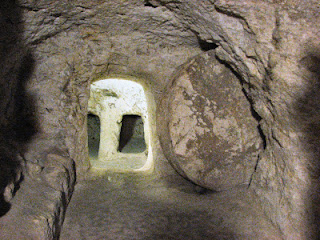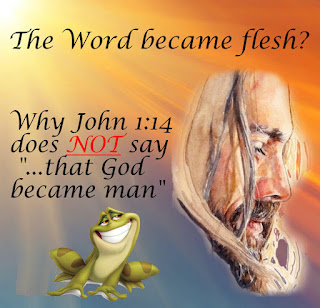The Trinity and Deity of Christ in the Book of Genesis
Dear friend who believes in the “Deity of Christ”,
I was once like you. I took it on authority, and
thought that the Bible presented Jesus as a God-man. I knew Jesus was a human,
but I thought there were a handful of biblical verses that also showed that
Jesus is God, a Second Person of a Godhead that took on flesh.
I now see that those handful of verses that I
thought showed the deity of Jesus, don’t. To interpret those handful of Scriptures
as evidence that Jesus is God does injustice to the Scriptures, and brings only
confusion and contradiction. There are better ways to understand those handful
of Scriptures.
Over the last year a number of biblical texts have
been presented to me to show that Jesus is God, and that God is a Trinity. I have translated some of those biblical texts, starting with a few texts from the Book of Genesis, in the way that my Trinitarian (or Deity of Christ)
friends are reading them.
In later articles I plan to post translations from
other books of the Bible. My translations and explanations are made
tongue-in-cheek, although many of the comments are explanations I’ve heard from
friends. For instance, I'll use the title "God the Son", even though this never occurs in the Bible, because many friends use the title. I do this to hopefully help people see the inconsistencies,
contradictions and sometimes absurdities of the Trinitarian and deity of Christ
interpretations.
If Jesus is God, or if God is a Trinity, we should
expect the Scriptures to read something like I’ve translated below. I recommend comparing the translations below
with real translations. God’s word is sharper than a two-edged sword. Blessings
in Messiah Jesus, the firstborn from the dead.
_ _ _ _ _ _ _
Genesis 1:1 In the beginning the Trinity**
created the heavens and the earth.
The word for “God” in Hebrew, “Elohim”, is plural, so
the Trinity is at least hinted at, if not outright presented here in Genesis
1:1 and in other occurrences of Elohim. The ancient Israelites only got a clue
of the multiplicity of persons in Elohim. Later it would be shown that God is three
persons. Neither Jesus nor anyone else
in the New Testament explained that the plural Elohim means a multiplicity of
persons (specifically three, the Trinity) but if we take into account all of
Scripture - the Trinity is everywhere in the Bible.
Gen 1:26 And God the Father**
said to God the Son and to God the Spirit, “Let us make
man in our image”.
**There is almost no need to comment on this text since as almost every pastor knows, this verse is an obvious reference to the Trinity. There is one little problem because
although we know that the plural Elohim is the Trinity (Gen. 1:1), we understand
here that Elohim must be referring only to one member of the Trinity (apparently
the First Person, God the Father). But
we can ignore the contradiction. The plural Elohim means the Trinity when we
want it to mean the Trinity, but only one member of the Godhead when we want it
to mean that.
Since Elohim said,
“Let us (plural) make”, He (the Father?) must be speaking to one
or both of the other persons of the Trinity. That He spoke “to God the Son and to
God the Spirit” is not in the original text, but this is what it means. It is a
mystery that only God the Father thought of creating man in their image, and
then proposed the idea to the other members of the Godhead, who didn’t seem to
consider the idea originally. We can be thankful that God the Father suggested creating
mankind, and that the other persons of the Trinity agreed, otherwise we
wouldn't be here.
One other comment. It doesn't matter that the vast majority of Trinitarian academic scholars in our day think the plural "Elohim" and "Let us make man" have absolutely nothing to do with God being a tri-personal being. These Trinitarian scholars think there are better ways to understand "Elohim" and Genesis 1:26. But we don't care. We are sticking with this interpretation and will keep it in our translation.
One other comment. It doesn't matter that the vast majority of Trinitarian academic scholars in our day think the plural "Elohim" and "Let us make man" have absolutely nothing to do with God being a tri-personal being. These Trinitarian scholars think there are better ways to understand "Elohim" and Genesis 1:26. But we don't care. We are sticking with this interpretation and will keep it in our translation.
Genesis 1:27 So the Trinity**
created*** man in Its image. In the image of the
Trinity They created him. Male and female They created them.
**Since one member of the Trinity was speaking to
other members before creating man, Elohim here must be the Trinity again,
unlike in the previous verse where Elohim was only God the Father. Elohim (the generic word for God) is a flexible term. We can interpret Elohim as singular or plural, changing from one verse to the next if needed.
***The singular verb “created” is problematic as are the thousands of other masculine singular verbs, pronouns and adjectives used with God (Elohim). Since God is three persons, it must be because God is one essence, not one person, that the ancient biblical languages used thousands of masculine singular verbs, pronouns and adjectives with Elohim. Since God is an essence we are justified in translating "created man in Its image".
***The singular verb “created” is problematic as are the thousands of other masculine singular verbs, pronouns and adjectives used with God (Elohim). Since God is three persons, it must be because God is one essence, not one person, that the ancient biblical languages used thousands of masculine singular verbs, pronouns and adjectives with Elohim. Since God is an essence we are justified in translating "created man in Its image".
Genesis 2:2 And on the seventh day the Trinity
finished His** work which He had done, and He rested on the
seventh day from all his work which he had done.
See comment on Gen. 1:27 above. Elohim here must be the
Trinity since all three persons were involved in creation. All the verbs and
pronouns relating to God (the Trinity) in this verse are masculine singular. Perhaps we should have been consistent with our
translation of Genesis 1:27, “They, the Trinity made man in its image”
since the singular-ness of God is an essence, not a person. But the plural pronoun (They) sounds polytheistic and the neuter "Its" sounds a
bit impersonal, so, for the rest of the Bible we will use masculine singular
pronouns (I, you [singular] and he/his) when referring to the Trinity, not
forgetting that God is really three persons.
Genesis 18:1 And the Pre-incarnate Second Person
of the Trinity** appeared to him (Abraham) in the plains of
Mamre.
**This is the personal name of Israel’s God, Yahweh/Yehovah.
The reference here can’t be to the First Person of the Trinity, because the
First Person of the Trinity can’t be seen (Exodus 33:20). The Third Person of
the Trinity is also unseen. The church “father” Justyn Martyr, ca AD 160, was the first commentator
to suggest this is a pre-incarnate appearance of the Logos (“The Word” of John
1:1), a second “god”. Later church fathers clarified for us that this must be
the Second Person of the Trinity, the Eternal God the Son.
For some reason the writers of the Gospels of Matthew, Mark and Luke, and the Book of Acts do not mention these important pre-existent appearances of the Eternal God the Son. Neither did the apostles Peter or Paul say anything about these pre-incarnate appearances of God the Son. Jesus only hinted at it in the Gospel of John. See later our translation of Exodus 3:14 and John 8:58 (forthcoming). The writer of the Book of Hebrews forgot about the pre-existent appearances of the Eternal God the Son (Hebrews 1:1).
For some reason the writers of the Gospels of Matthew, Mark and Luke, and the Book of Acts do not mention these important pre-existent appearances of the Eternal God the Son. Neither did the apostles Peter or Paul say anything about these pre-incarnate appearances of God the Son. Jesus only hinted at it in the Gospel of John. See later our translation of Exodus 3:14 and John 8:58 (forthcoming). The writer of the Book of Hebrews forgot about the pre-existent appearances of the Eternal God the Son (Hebrews 1:1).
Genesis 18:2-5 And he (Abraham) said, “Oh 2nd
Person of the Trinity…let a little water be brought, and wash your feet, and
rest yourselves under a tree…while I bring a morsel of bread, that you may
refresh yourselves…”
See above Gen. 18:1. Justin Martyr (ca. AD 160) tells
us that this is a Pre-incarnate Logos appearing to Abraham. However, even
Justin didn’t realize this was actually the Second Person of the Trinity.
Genesis 18:13 And Yahweh**, the
Pre-Incarnate Second Person of the Trinity, said to Abraham, “Why did Sarah
laugh?”
**Just like with Elohim, the generic title for God, it is
not always easy to determine which person of the Trinity is intended by the
name Yahweh (His name may have been pronounced Yehowah). But God’s personal name,
Yahweh/Yehowah, also has flexibility in number. Yahweh must be here the singular Second
Person of the Trinity, the Eternal God the Son, since, as noted above in Gen.
18:1, the First Person cannot be seen by man. Other times the name Yahweh can
refer to the First Person, or even to all three of the Trinity persons together
(e.g., Genesis 2:4). See our comments (forthcoming) on Deuteronomy 6:4 which
says that Yahweh is only one.
Genesis 18:22 So the men turned from there and
went toward Sodom, but Abraham still stood before the Pre-incarnate Second
Person of the Trinity.
This translation is warranted to make it clear that Abraham
was with the Second Person of the Trinity, the Eternal God the Son, appearing
as a man, but still pre-Incarnate. Moses was only given clues, and therefor
only passed on those clues when he wrote Genesis. But now that we understand
the clues, we can make it clear in translation.
We aren’t sure why the Trinity only gave Moses clues. Maybe Moses was primitive and God the Trinity didn’t want to reveal everything about His Tri-personality so early. Moses would not have had the capacity to understand that there are really three persons of God. Or maybe Moses did know that God is a Trinity, but he didn’t want to spell it out in black and white because he knew the Israelites weren’t ready to understand. He only gave clues so that later people, especially Gentiles, would see those clues and understand.
We aren’t sure why the Trinity only gave Moses clues. Maybe Moses was primitive and God the Trinity didn’t want to reveal everything about His Tri-personality so early. Moses would not have had the capacity to understand that there are really three persons of God. Or maybe Moses did know that God is a Trinity, but he didn’t want to spell it out in black and white because he knew the Israelites weren’t ready to understand. He only gave clues so that later people, especially Gentiles, would see those clues and understand.
“…you have perverted the words of the living God,
the LORD of hosts, our God” (Jeremiah 23:36).


Comments